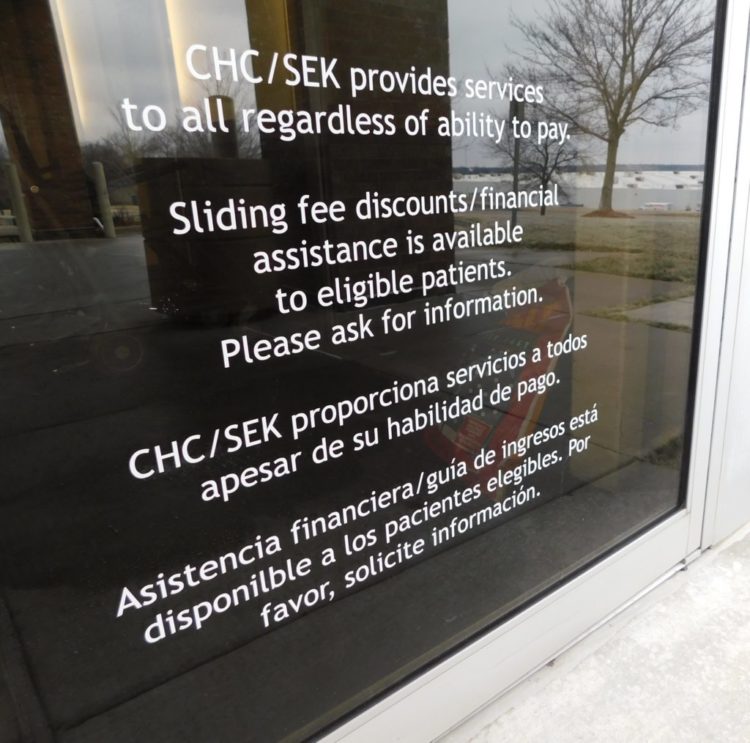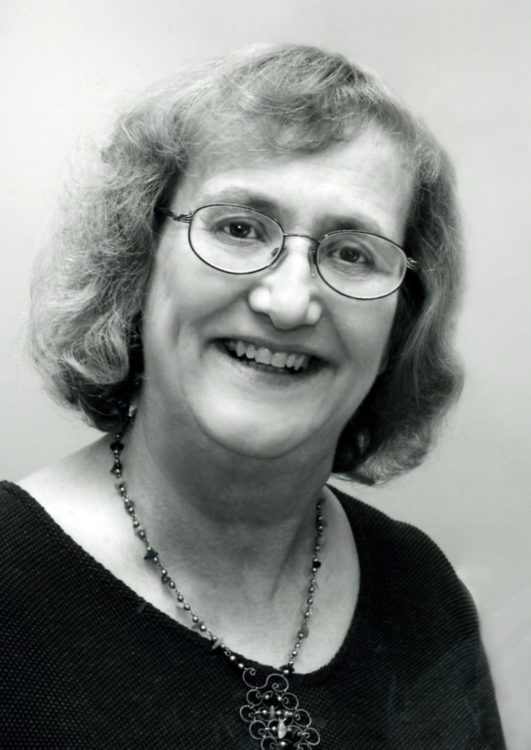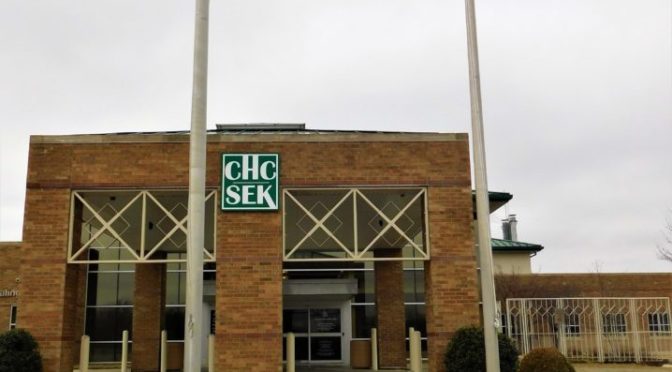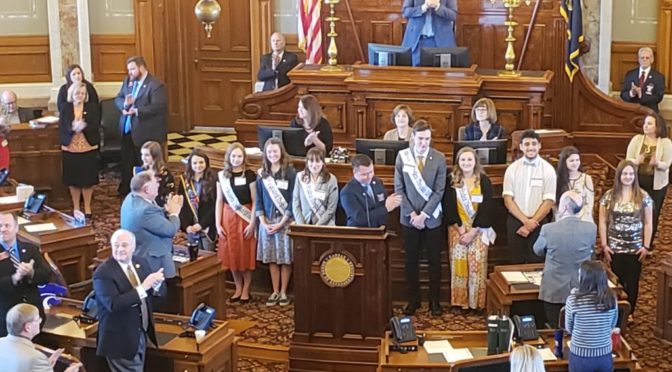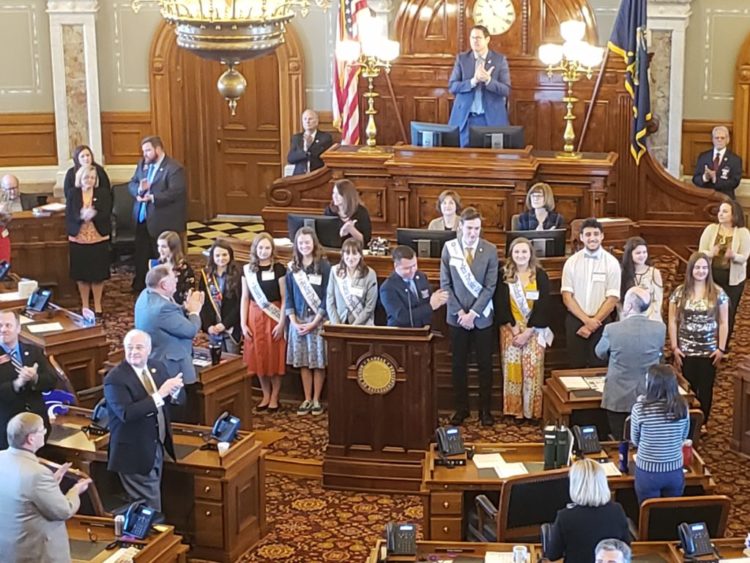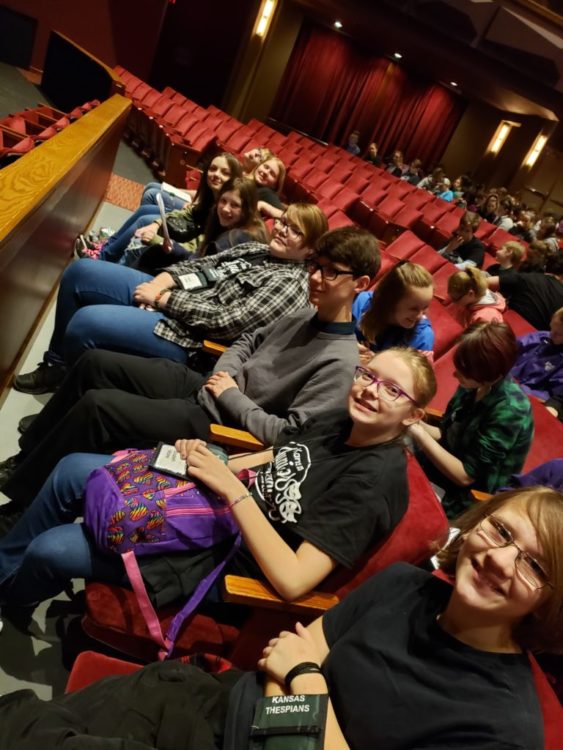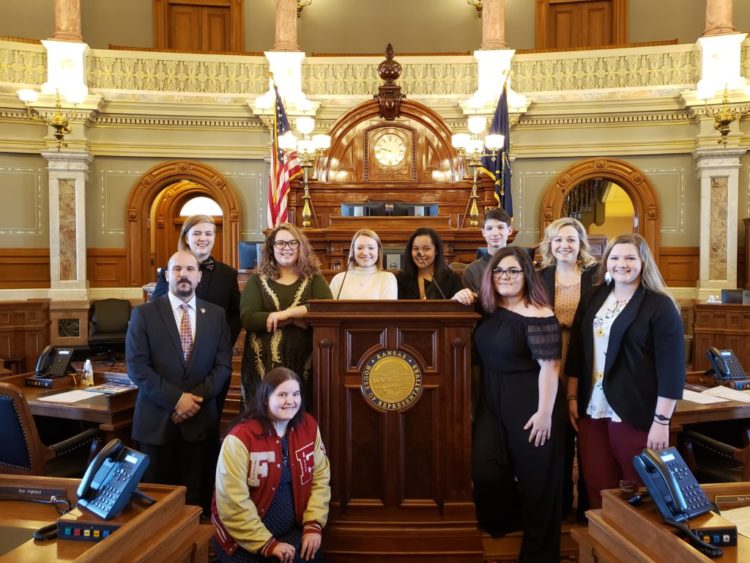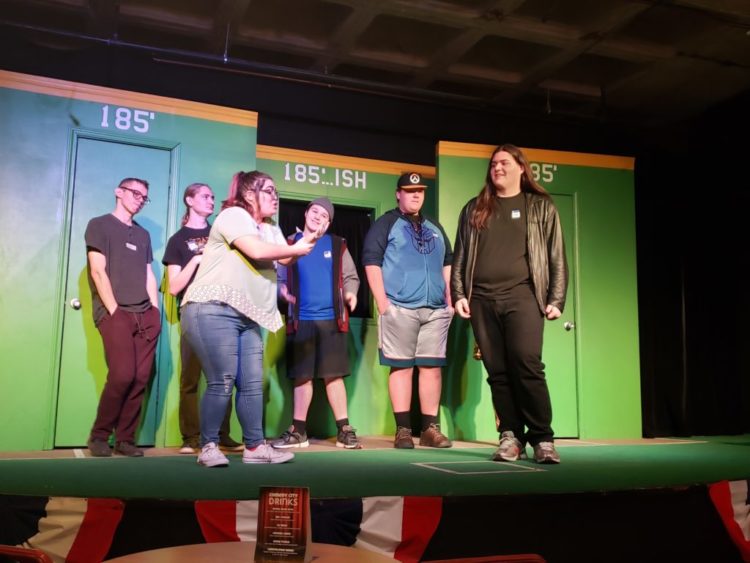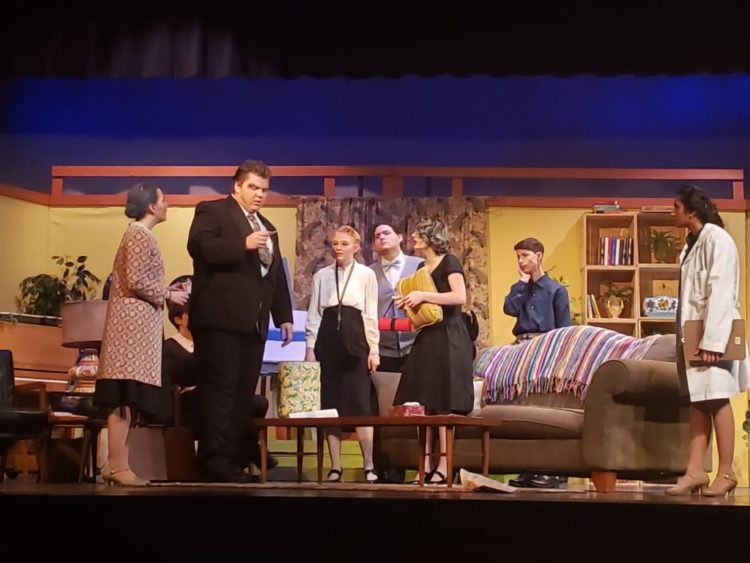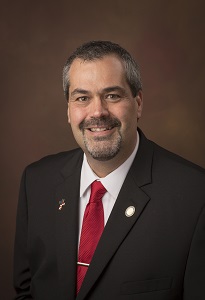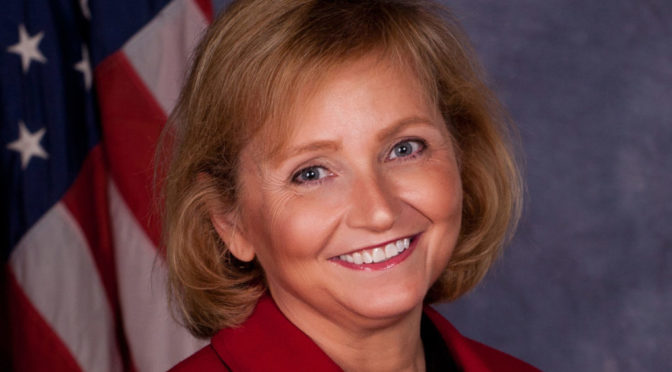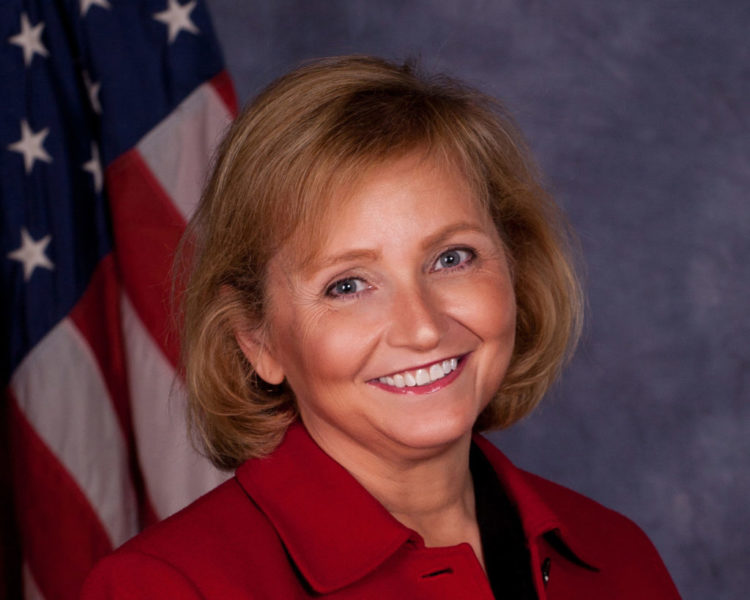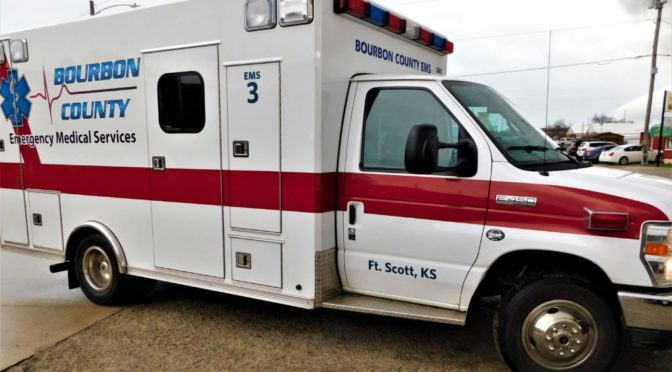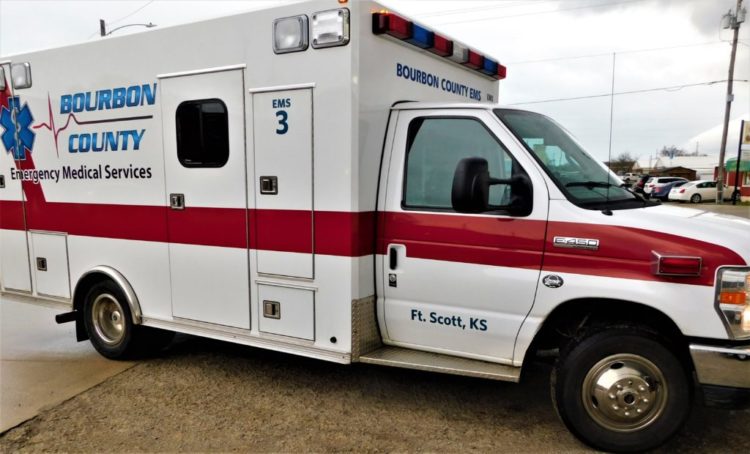FLOOR ACTION
DISSOLVING THE WHITE CLAY WATERSHED DISTRICT NO. 26 (
HB 2188): House Bill 2188 would make the City of Atchison responsible for the maintenance and repair of all watershed lakes, dams, and other projects of the White Clay Watershed District 26. HB 2188 would also create an exemption to election requirements in law relating to the property tax lid. This bill passed and placed on the Consent Calendar 39-0.
TRANSFER OF TUBERCULOSIS CONTROL PROGRAM DUTIES (
HB 2201): House Bill 2201 would transfer the powers, duties, and functions of the Tuberculosis Control Program from the Kansas Department for Aging and Disability Services (KDADS) to the Kansas Department of Health and Environment (KDHE). This bill passed and placed on the Consent Calendar 39-0.
DELAYING KPERS MEMBERSHIP ELIGIBILITY (
SB 210): Senate Bill 210 would delay the Kansas Public Employees Retirement System (KPERS) membership eligibility by two years for employees employed in direct support positions in Community Developmental Disability Organizations. An employee would become a member of KPERS on the first day of the payroll period coinciding with or following completion of a two-year training period. This bill passed the Senate 39-0.
AMENDING REQUIREMENTS FOR KTA AND THE SECRETARY OF TRANSPORTATION (
S Sub HB 2007): Senate Substitute for House Bill 2007 would amend requirements for tolled projects of the Kansas Turnpike Authority (KTA) and the Secretary of Transportation. This bill passed the Senate 38-1(I voted in favor of this bill).
AMENDING THE KANSAS 911 ACT (
HB 2084): House Bill 2084 would revise the Kansas 911 Act and repeal three outdated statutes not included in the Act. This bill passed the Senate 36-3(I voted against this bill. This bill will almost double the fees on phone bills).
REQUIREMENTS FOR REINSTATEMENT OF A RURAL WATER DISTRICT(
HB 2085): House Bill 2085 would clarify if a rural water district (RWD) has available capacity, the board of a RWD must adhere to the benefit unit reinstatement requirements in current law. The bill also increases the maximum repayment period from 20 years to 40 years for loans provided by the Secretary of Health and Environment to municipalities for the payment of all or part of a project associated with a public water supply system. This bill passed the Senate 39-0.
UPDATING STATE CREDIT UNION STATUTES (
HB 2101): House Bill 2101 would make several amendments and technical updates to the laws governing credit unions and related credit union procedures and designate Article 22 of Chapter 17, Kansas Statutes Annotated, as the State Credit Union Code. This bill passed the Senate 39-0.
AMENDING THE REVISED KANSAS CODE FOR THE CARE OF CHILDREN (
HB 2103): House Bill 2103 would amend the revised Kansas Code for the Care of Children and enact statutory provisions to enable the state to meet the requirements of the federal Family First Prevention Services Act. The bill would define a qualified residential treatment program (QRTP), establish notice and hearing requirements when a child is placed in a QRTP, require certain action to be taken by the court when QRTP placement occurs, and place additional documentation requirements on the court in a permanency hearing involving a child placed in a QRTP. Further, the bill would amend the definition of a secure facility, require a child in need of care petition to have an attached copy of any existing prevention plan for a child, and make technical amendments. This bill passed the Senate 39-0.
AMENDMENTS RELATING TO DRIVING UNDER THE INFLUENCE (
HB 2104): House Bill 2104 would amend the statute governing tests related to driving under the influence (DUI), effective July 1, 2019, to amend the oral and written notice a law enforcement officer must provide when requesting a person take such a test. Specifically, the bill would clarify in such notice that refusal to submit to and complete the test or tests will result in suspension of the person’s driving privileges for a period of one year and test failure will result in suspension of the person’s driving privileges for a period of either 30 days or one year.
The bill also would amend the statute governing preliminary screening tests related to DUI to remove provisions stating a person operating or attempting to operate a vehicle in Kansas is deemed to have given consent to such tests, setting forth the required notice when a person is requested to take such test, and stating refusal to take and complete such test is a traffic infraction. This bill passed the Senate 39-0.
ACCOUNTING TREATMENT OF CERTAIN DERIVATIVE INSTRUMENTS OF FIXED INDEX ANNUITIES (
HB 2177): House Bill 2177 would create law permitting life insurance companies that offer fixed index annuities (FIAs) to utilize an alternative methodology accounting for FIA hedging and associated reserves. This bill passed the Senate 39-0.
REVISING THE WORKING AFTER RETIREMENT PROVISIONS OF KPERS (
HB 2203): House Bill 2203 would revise the working-after retirement provisions of the Kansas Public Employees Retirement System (KPERS) by adding a new category of positions exempt from the law and reimbursing certain suspended benefits for a specific period of time. The bill would add individuals employed by the Kansas academies of the U.S. Department of Defense STARBASE Program to the list of exemptions.
The participating employer would not have to enroll retirees into KPERS or report compensation to the Retirement System. The participating employer would not make contributions to KPERS. However, retirees would still be required to serve their 60 or 180-day waiting period, as applicable, before returning to covered employment, provided there is no prearranged agreement for employment. Currently, there are eight categories of retirees who may work after retirement:
● Nurses or practical nurses employed at certain state institutions
● Certain school district positions defined by KSA 74- 4937 (3), (4), and (5)
● Law enforcement officers employed by the Law Enforcement Training Center
This bill passed the Senate 39-0.
INCREASING REGISTRATION FEES FOR ELECTRIC & HYBRID VEHICLES (
S Sub HB 2214): Senate Substitute for House Bill 2214 would add vehicle registration fees of $100 for all-electric vehicles and $50 for motor vehicles that are conventional electric hybrid and plug-in electric hybrid vehicles. The new fees would be effective on and after January 1, 2020. This bill passed the Senate 36-3(I voted against this bill. This bill increases fees on electric and hybrid vehicles. While most of the road usage is in cities and counties, the state will be the only benefactor from these increased fees).
AUTHORIZING THE KANSAS STATE FAIR BOARD TO CREATE A NONPROFIT CORPORATION (
HB 2215): House Bill 2215 would authorize the Kansas State Fair Board to establish a 501(c)(3) nonprofit corporation. The purpose of the nonprofit corporation would be to receive gifts, donations, grants, and other moneys and engage in fundraising projects that benefit the Kansas State Fair. The board of directors of the nonprofit corporation would consist of the members of the executive committee of the Fair Board, the General Manager of the Kansas State Fair, and other directors designated by the Fair Board. This bill passed the Senate 38-0.
CHANGING THE REQUIREMENTS TO BEGIN PRODUCTION ON DISTINCTIVE LICENSE PLATES (
HB 2246): House Bill 2246 would amend requirements for distinctive license plate development and for continuing distinctive license plates and would add several new distinctive license plates to be issued on and after January 1, 2020. The bill would add military branch license plates and three license plates for which royalty fees would be paid: proud educator license plates, Alpha Kappa Alpha license plates, and Knights of Columbus license plates. This bill passed the Senate 39-0.
REQUIRING A DULY ORDAINED MINISTER OF RELIGION TO REPORT CHILD ABUSE (
SB 218): Senate Bill 218 would amend law related to mandated reports of child abuse. The bill would add duly ordained ministers of religion to the list of persons required to report suspected child abuse. The bill would specifically state ordained ministers would not be required to violate penitential communication privilege to make such a report. Continuing law requires listed persons to make a report when such person has reason to suspect that a child has been harmed as a result of physical, mental, emotional, or sexual abuse, or neglect. Willful and knowing failure to make a required report is a Class B misdemeanor. This bill passed the Senate 39-0.
AMENDING LICENSE AND RENEWAL APPLICATION FEES FOR INSURANCE THIRD PARTY ADMINISTRATORS (
SB 228): Senate Bill 228 would amend license and renewal application fees and establish an annual report fee in the Third Party Administrators Act. The bill would amend the initial license application fee for home state and non-resident TPAs from “as provided for by rules and regulations” to the specified amount of $400 and require an annual report fee of $100 for both home state and non-resident TPAs. The bill would establish a $200 renewal application fee for each non-resident administrator renewal application. This bill passed the Senate 38-1(I voted in favor of this bill.)
AMENDING PROVISIONS RELATING TO ADULT CARE HOME LICENSURE (
SB 232): Senate Bill 232 would amend the Adult Care Home Licensure Act regarding the application for licensure, financial solvency, and receivership of adult care homes. The bill would require the application for a license to operate an adult care home include evidence of access to sufficient working capital necessary to operate an adult care home and include a list of current or previously licensed facilities in Kansas or outside the state in which an applicant has or previously had any ownership interest in the operations or the real property of the facility. This bill passed the Senate 39-0.
CONTINUING THE 20 MILL STATEWIDE LEVY FOR SCHOOLS (
SB 235): Senate Bill 235 would continue the 20 mill statewide levy for schools and exempt certain portions of property used for residential purposes from such levy. This bill passed the Senate 39-0.
AMENDING THE DEFINITION OF SERVICE-CONNECTED IN THE KANSAS POLICE AND FIREMEN’S RETIREMENT SYSTEM (
HB 2031): House Bill 2031 would revise the definition for “service-connected,” as that term is used to determine death and disability benefits in the Kansas Police and Firemen’s Retirement System. Under current law, service-connected causes for death and disability benefits include heart disease, lung or respiratory disease, and cancer. The bill would add blood borne pathogens. This bill passed the Senate 39-0.
PROVIDING SALES TAX AUTHORITY TO CERTAIN COUNTIES (
HB 2033): House Bill 2033 would retroactively ratify the results of a 2017 election in Finney County seeking to increase that county’s tax by 0.3 percent and would clarify the county has such rate authority. The tax imposed by the election would be for purposes of an inter local agreement between the Finney County and the City of Garden City regarding certain infrastructure upgrades and would sunset after 15 years.
The bill would require the Director of Taxation to confirm all provisions of law applicable to the authorization of local sales taxes have been followed prior to causing collections to commence. Should the Director discover a city or county did not comply with the authorization law after collections have commenced, collections would cease until such error has been remedied. This bill passed the Senate 39-0.
REVOKING SPOUSAL INHERITANCE RIGHTS UPON DIVORCE (
HB 2038): House Bill 2038 would create law within the Kansas Probate Code providing for the automatic revocation of certain inheritance rights of a former spouse or former spouse’s relatives upon divorce, as follows. This bill passed the Senate 38-1(I voted in favor of this bill).
DESIGNATING A PORTION OF US HIGHWAY 75 AS THE JOHN ARMSTRONG MEMORIAL HIGHWAY (
HB 2070): House Bill 2070 would designate the portion of US-75 from the junction of US-75 and NW 46th Street in Shawnee County to the junction of US-75 and I-70 as the John Armstrong Memorial Highway and would remove this portion of US-75 from designation as the Purple Heart/Combat Wounded Veterans Highway. The bill also would designate bridge No. 018-011 on US77 in Cowley County as the SGT Kevin A. Gilbertson Memorial Bridge. This bill passed the Senate 39-0.
ALLOWING CERTAIN LIGHT SCREENING MATERIAL ON MOTOR VEHICLE WINDOWS (
HB 2087): House Bill 2087 would amend the Uniform Act Regulating Traffic on Highways regarding sun screening devices on motor vehicle windows. The bill would authorize the installation of a clear, colorless, and transparent material on a vehicle’s windshields, side wings, side windows, or rear windows if certain conditions are met. This bill passed the Senate 39-0.
ALLOWING KPERS BOARD MEMBERS TO DEVELOP CERTAIN POLICIES (
HB 2119): House Bill 2119 would authorize the Kansas Public Employees Retirement System (KPERS) Board of Trustees to develop policies and procedures to procure goods and services based upon sound business practices and in accordance to the Professional Services Sunshine Act. The bill would authorize in and out-of-state travel by KPERS employees and board trustees in accordance to current laws dictating mileage allowance rates for private vehicles. The board currently has the authority to procure its contracts for professional and consultant services, including actuarial consulting, investment management and consulting, and legal services. This bill passed the Senate 39-0.
REQUIRING OPERATORS OF A MOTOR VEHICLE TO PROMPTLY DELIVER DRIVER’S LICENSE UPON DEMAND BY OFFICER (
HB 2125): House Bill 2125 would require the holder of a driver’s license who is operating a motor vehicle to promptly deliver, rather than display, the driver’s license upon demand of any officer of a court of competent jurisdiction, any peace officer, or any examiner or officer of the Division of Vehicles of the Department of Revenue. The requirement would apply when the driver’s license is in the licensee’s immediate possession at the time of the demand. This bill passed the Senate 39-0.
ALLOWING THE KBI TO PARTICIPATE IN THE KANSAS DROP ACT (
HB 2140): House Bill 2140 would allow agents of the Kansas Bureau of Investigation (KBI) to participate in the Kansas Deferred Retirement Option Program (DROP) of the Kansas Police and Firemen’s Retirement System, which is currently authorized for troopers, examiners, and officers of the Kansas Highway Patrol (KHP). The sunset date for the program would be extended from January 1, 2020, to January 1, 2025. This bill passed the Senate 39-0.
REQUIRING COMMUNITY COLLEGES TO PUBLISH CERTAIN TAXPAYER AND STUDENT TRANSPARENCY DATA (
HB 2144): House Bill 2144 would amend law related to community college student fees and enact the Community College Taxpayer Transparency Act. The bill would include findings and conclusions generally noting the structure and financing of community colleges; the duty of transparency owed by community colleges to property taxpayers and students of community colleges; and reaffirming the students and taxpayers of community colleges as the priority in financial decisions, reporting processes, and transparency measures of community colleges. This bill passed the Senate 39-0.
PROVIDING SALES TAX AUTHORITY FOR WABAUNSEE COUNTY (
HB 2160): House Bill 2160 would make a number of changes to local sales tax authorization statutes and create a sales tax exemption for certain coins and bullion. This bill passed the Senate 39-0.
AUTHORIZING THE STATE BOARD OF REGENTS TO SELL TWO PIECES OF PROPERTY (
HB 2168): House Bill 2168 would authorize the Kansas Board of Regents to sell two pieces of property on behalf of Kansas State University and one on behalf of the University of Kansas, with the proceeds from the funds deposited to the restricted use account of the respective universities to be used for deferred maintenance.
The bill would require the deeds, titles, and conveyances be reviewed and approved by the Attorney General. The conveyances would be subject to state appraisal requirements, but not subject to state surplus property requirements. The properties are in Douglas County, Riley County, and Saline County. This bill passed the Senate 39-0.
ALLOWING FOR WIDER VARIETY OF AGRICULTURAL PRODUCTS IN THE PRODUCTION OF WINE (
HB 2223): House Bill 2223 would revise the Liquor Control Act to allow for producers of certain fermentation products to sell wine made at a farm winery. The farm wine would be required to meet the minimum Kansas content requirements. A vineyard permit would be renamed a producer license, which would be available to producers of grapes, with not less than 100 vines; ripe fruit, or berries, not less than 1,000 pounds; or honey, not less than 100 pounds.
Each producer licensee would be required to secure a $500 bond under the Liquor Control Act, and they would be liable for payment of liquor drink and liquor enforcement taxes. A producer license would be valid for two years, and it would cost $200. The bill would require licensees to maintain records and sales receipts, which could be inspected by the Division of Alcohol Beverage Control (ABC) of the Department of Revenue, the Secretary of Revenue, or any law enforcement officer. Under the bill, if a producer licensee is also licensed as a club or drinking establishment, the producer license would allow for the sale of domestic wine and other alcoholic liquor, as authorized by the Club and Drinking Establishment Act.
If the producer licensee also has a cereal malt beverage license, the producer would be allowed to sell beer not exceeding 6.0 percent by volume, as authorized by the Kansas Cereal Malt Beverage Act. The bill would allow a producer licensee to prohibit a person from possessing alcoholic liquor or cereal malt beverage not purchased on the licensee’s premises. This bill passed the Senate 39-0.
INCREASING PERMIT FEES FOR OVERSIZED VEHICLES (
S Sub HB 2225): Senate Substitute for House Bill 2225 would increase fees for certain permits authorizing oversize or overweight vehicles to operate on designated routes and would require registration of escort vehicle companies. This bill passed the Senate 35-4(I voted against this bill. This bill will double fees on our trucking industry).
ALLOWING ATVS TO CROSS FEDERAL OR STATE HIGHWAYS (
HB 2248): House Bill 2248 would authorize operation of all-terrain vehicles (ATVs) and work-site utility vehicles to cross a federal highway or a state highway. The bill also would authorize a person engaged in agricultural purposes to operate an ATV or work-site utility vehicle on a federal highway or state highway outside the corporate limits of any city under certain conditions. This bill passed the Senate 39-0.
ENACTING THE KANSAS TAXPAYER PROTECTION ACT (
SB 104): Senate Bill 104 would enact the Kansas Taxpayer Protection Act, enact the Golden Years Homestead Property Tax Freeze Act, allow disabled veteran renters to claim the property tax refunds under the current Homestead Property Tax Refund Act, and allow individual income taxpayers to claim the expense deduction. This bill passed the Senate 39-0.
INCREASING PENALTIES FOR THE ABUSE OF A CHILD AND INVOLUNTARY MANSLAUGHTER (
SB 108): Senate Bill 108 would amend the penalties for the crimes of involuntary manslaughter and abuse of a child and a mitigating factor for sentencing when a victim is an aggressor or participant in the criminal conduct associated with a crime of conviction. This bill passed the Senate 39-0.
SCRAP METAL THEFT REDUCTION ACT (
Sub SB 219): Substitute for Senate Bill 219 modifies the Scrap Metal Theft Reduction Act (Act). The bill would establish the Scrap Metal Data Repository Fund (Fund) in the State Treasury, to be administered by the Director of the Kansas Bureau of Investigation (KBI). Expenditures from the Fund would be made in accordance with appropriation acts upon warrants of the Director of Accounts and Reports issued pursuant to vouchers approved by the Director of the KBI or designee. Moneys credited to the Fund would be expended for the administration of the duties, functions, and operating expenses incurred under the provisions of the Act. The Attorney General could transfer moneys from the Scrap Metal Theft Reduction Fee Fund to the Fund via certain procedures. The bill replaces references to the Attorney General with the KBI in provisions, making the KBI responsible for establishing and maintaining the database.
The review deadline and sunset date for a Kansas Open Records Act exception for the information maintained in the database is extended until July 1, 2024. An outdated database report requirement is replaced with a requirement that the Attorney General submit annual reports on or before February 1, beginning in 2020, regarding the implementation, administration, and enforcement of the Act. The report is then submitted to the President of the Senate, the Speaker of the House of Representatives, and the Senate and House Committees on Judiciary. Language was added prohibiting any entity contracting with the Attorney General or the KBI to provide or maintain the database from requiring a scrap metal dealer (dealer) to contract with the entity for the authority to release proprietary or confidential data, including customer information. Such entities would be prohibited from charging any fee to the dealer as a condition of providing information to the database required by the Act, including an electronic submission fee. Stated that a dealer providing information to the database as required by the Act shall not be subject to civil liability for any claim arising from the negligence or omission by the State of Kansas or any contracting entity in the collection, storing, or release of information provided by the dealer to the database. Requirements in a statute related to information a seller of regulated scrap metal must provide and the dealer’s register of such information requires the seller’s telephone number be provided and included in the register; remove a requirement that a legible fingerprint be obtained from a seller if the seller uses an official governmental document for a country other than the United States to meet certain requirements; allow a copy of a card or document already in a dealer’s register to suffice for subsequent transactions; remove civil penalties for failure to comply with these requirements; and remove a provision making these requirements unenforceable from June 1, 2017,to January 1, 2020. A provision that the dealer forwards the information required by this statute to the database now requires such forwarding occur for each transaction within 72 hours of the transaction. Removed is the criminal history records check and fingerprinting requirements for persons filing for registration.
Effective January 1, 2020, the registration and registration renewal fees at “not more than $500.” Under current law, the registration fee is set at “not less than $500 nor more than $1,500” and the renewal fee is set at “not more than $1,500.” This bill passed the Senate 35-4( I voted in favor of this bill, because it will lower the fees, and penalties).
RECOGNITION OF TRIBAL COURT JUDGMENTS (
HB 2039): House bill 2039 creates law that district courts shall extend full faith and credit to orders, judgments, and other judicial acts of tribal courts of any federally recognized Indian tribe, pursuant to Kansas Supreme Court rules. Such recognition would be extended only to judgments of those tribal courts who grant full faith and credit to judgments of Kansas state courts. Specified that any person who files a tribal court judgment would be required to pay a docket fee as prescribed by continuing law in the Kansas Code of Civil Procedure, and that any additional fees or charges not specifically covered by such docket fee would be assessed as additional court costs in the same manner and extent as if the action had been originally filed in the court where the tribal court judgment is filed. This bill passed the Senate 37-2(I voted against this bill. This bill states that the district courts shall extend full faith and credit to the orders, judgements and other judicial acts of the tribal courts of any federally recognized Indian tribe.)
ESTABLISHING A COMMERCIAL INDUSTRIAL HEMP PROGRAM (
S Sub HB 2167): Senate Substitute for House Bill 2167 would require the Kansas Department of Agriculture (KDA), in consultation with the Governor and Attorney General, to submit a plan to the U.S. Department of Agriculture (USDA) regarding how the KDA will monitor and regulate the commercial production of industrial hemp within the state, in accordance with federal law.
In addition, the bill would establish the Commercial Industrial Hemp Program, make changes to the Industrial Hemp Research Program, create the Industrial Hemp Regulatory Commission, create the Hemp Processor License, establish prohibitions on specific products, establish sentencing guidelines, and establish waste disposal requirements. This bill passed the Senate 39-0.
KANSAS UNDERGROUND UTILITY DAMAGE PREVENTION ACT (
HB 2178): House Bill 2178 modifies law concerning the duty of an operator to mark the tolerance zone (the area not less than 24 inches of the outside dimensions in all horizontal directions) around an underground facility within the Kansas Underground Utility Damage Prevention Act (KUUDPA). The definition of “operator” changes to specify an electric public utility would not be considered an operator of any portion of an underground facility that is on another person’s side of the point where ownership of the facility changes from the electric public utility to another person as determined by the electric public utility’s rules and regulations, tariffs, service or membership agreements or other similar documents. Provided in the bill is if the operator of a facility used for transporting, gathering, storing, conveying, transmitting or distributing gas, electricity, communications, crude oil, refined or reprocessed petroleum, petroleum products or hazardous liquids, is also a provider of electricity, the duty of the operator to mark the tolerance zone would not extend to another person’s side of the point where ownership of the facility changes from the operator to another person as determined by the operator’s rules and regulations, tariffs, service, or membership agreements or similar documents. Definition of “operator” would be clarified to include any person who leases (rather than operates) an underground Tier 1 or Tier 2 facility. On or after July 1, 2019, the notification center must notify any person or excavator requesting identification of the location of underground facilities that utilities are only required to identify the location of utility-owned facilities and not the location of privately-owned facilities. This bill passed the Senate 38-1(I voted in favor of this bill).
EXECUTION OF A SEARCH WARRANT FOR ELECTRONICALLY STORED INFORMATION (
HB 2191): House Bill 2191 adjust law concerning the execution of search warrants. Specifically, stated is warrants issued after July 1, 2019, for electronically stored information, electronic devices, or media capable of storing electronically stored information located in Kansas would authorize the transfer of such information, devices, or media for examination and review anywhere within the state or outside the state at any time after the seizure unless otherwise specified by the warrant. This bill passed the Senate 39-0.
WAVIER OR REDUCING DRIVER’S LICENSE REINSTATEMENT FEES (
HB 2211): House Bill 2211 alters the law concerning driver’s license reinstatement fees. Specifically, it would allow a person who is assessed a driver’s license reinstatement fee and surcharge as provided by continuing law to petition the court to waive payment of such fee and surcharge. The court could waive, in whole or in part, or modify the method of payment of such fee and surcharge if it finds payment of the assessed amount would impose manifest hardship on that person or that person’s immediate family. This bill passed the Senate 39-0.
CREATING A CRIME VICTIMS COMPENSATION DIVISION (
HB 2290): House Bill 2290 would create and amend law concerning the Office of the Attorney General and amend law concerning payment of claims and defense expenses pursuant to the Kansas Tort Claims Act. This bill passed the Senate 39-0.
PROVIDING FOR CONFIDENTIAL COMMUNICATIONS OF KANSAS NATIONAL GUARD MEMBERS IN PEER SUPPORT COUNSELING SESSIONS (
HB 2365): House Bill 2365 revises law concerning the peer support counseling session communication privilege within the Code of Civil Procedure. Added are references to National Guard members (such members are defined by the bill as a regularly enlisted, officer, or civilian member of the Kansas National Guard) throughout the section, to make notes, records, or reports arising out of peer support counseling sessions involving National Guard members confidential, exempt from the Kansas Open Records Act (KORA), and inadmissible and not subject to disclosure or discovery in judicial and other proceedings. The exemption for records arising out of peer support counseling sessions would not be required to be reviewed by the Legislature and would not expire. This bill passed the Senate 39-0.
CONSIDERATION OF APPOINTMENTS
Department of Revenue, Secretary – Mark Burghart
The Senate confirmed the nomination on a vote of 38-1(I voted in favor of this appointment).
Department of Transportation, Secretary – Julie Lorenz
The Senate confirmed the nomination on a vote of 38-1(I voted in favor of this appointment).
